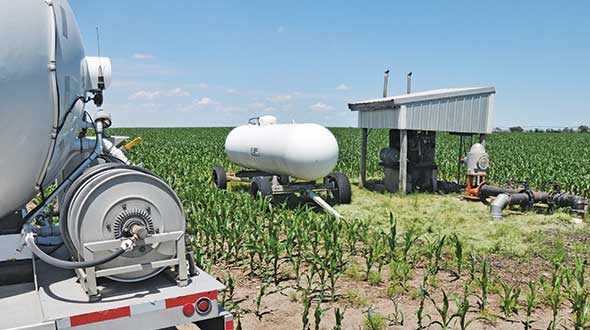A rundown on propane irrigation motors

It’s time farmers realize the benefits of propane to power their irrigation engines. Photo courtesy of Christopher Bristol of Envision: Creative Solutions
What do your customers think when they hear the word “propane”? Heating source, grilling, grain drying or maybe even the animated television show “King of the Hill” featuring Hank Hill as the main character? Most of them probably don’t think “irrigation motor fuel.”
In the central Plains states, propane has been used to power irrigation wells for years. Ag producers experienced with propane-powered irrigation engines often express their satisfaction with the longevity and durability of them.
Newer propane engine technology has eliminated the problems associated with the propane vapor technology used years ago. Many advances have been made in the use of propane as a motor fuel, and it is considered to be a dependable fuel source.
Here in Illinois, many irrigation systems are in place due to sandy soil conditions. Ag producers would not be successful in growing crops in this area if not for the advancement of modern irrigation equipment.
Growers often believe only three power options exist for irrigation motors: electric, diesel and gasoline. Not only do farmers have another option, the alternative option (propane) typically rewards operators with thousands of dollars in savings over the life of the unit.
Recently, a two-year study by Sunrise FS, a division of Growmark, compared the advantages of propane-powered irrigation motors versus their diesel counterparts. Eight units were considered, and the results were positive for propane. Not only was the upfront cost of the propane units about half of the cost of the diesel engines, but growers were also saving $1.50 to $6 per hour in fuel costs, depending on the size of the unit.
Propane is also a clean-burning fuel and is much better for the environment. New diesel engines require diesel exhaust fluid to meet environmental emissions standards. Propane motors do not. Also, noise pollution is significantly reduced when comparing the propane motor to the diesel unit.
Storage is yet another advantage of propane. In wet growing seasons, little diesel fuel may be used, and it could sit in storage tanks for extended periods. Diesel fuel can oxidize, take on moisture from condensation and become infested with microbes, requiring rescue treatments or blending.
Propane, however, will burn just as well the following season as it did the day it was put into the tank. It can be stored for years.
If these benefits are not enough to get your customers to switch that old diesel motor to propane, there’s more. The Propane Education & Research Council (PERC) Farm Incentive Program has an incentive on propane irrigation motors worth up to $5,000. In return for the incentive, PERC requests minor recordkeeping for additional data and operational results.
As in all successful business operations, total cost of ownership is important in farm operations. By choosing a propane-powered irrigation motor over a diesel-powered unit, farmers can cut their total cost of ownership for that irrigation motor in half.
Just remember, the next time your farming customers are ready to replace an irrigation motor, make sure they know about other options besides electric, diesel and gasoline.
Upfront costs, maintenance and the lower cost of fuel make propane-powered irrigation motors a great alternative. When it comes to the total cost of ownership, propane is a proven winner.
Zach Baugher is the propane marketing and technical services manager at Growmark Inc. He can be reached at zbaugher@growmark.com or by calling 309-557-6390.
















